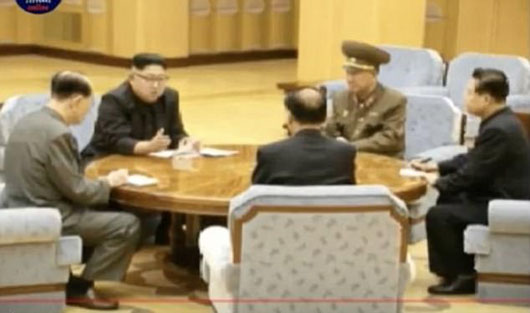by WorldTribune Staff, September 3, 2017
In the wake of North Korea’s test of a 100-kiloton hydrogen bomb, U.S. President Donald Trump had harsh words for the Kim Jong-Un regime in Pyongyang, but also came down hard on South Korea for what he said was Seoul’s policy of “appeasement.”
“South Korea is finding, as I have told them, that their talk of appeasement with North Korea will not work, they only understand one thing!,” Trump tweeted on Sept. 3.

South Korean President Moon Jae-In’s administration, even up until last week, had pressed for “dialogue” with the North. Trump said that “talking is not the answer.”
In a series of tweets starting around 7:45 a.m., Trump noted: “North Korea has conducted a major Nuclear Test. Their words and actions continue to be very hostile and dangerous to the United States.”
When asked on Sept. 2 if the U.S. would attack North Korea, Trump responded, “We’ll see.”
In an early-morning phone call on Sept. 3, Gen. Joseph Dunford, chairman of the U.S. Joint Chiefs of Staff, promised support and co-operation to his South Korean counterpart. Gen. Jeong Kyeong-Doo, Yonhap news agency reported.
Jeong’s office said that the pair had “agreed to discuss all military measures against the North,” and added that Gen. Vincent K. Brooks, commander of U.S. Forces Korea and the allies’ Combined Forces Command, agreed shortly after the detonation to take action “as soon as possible.”
South Korea’s presidential office said security leaders for Seoul and Washington have spoken following North Korea’s sixth nuclear test, which it carried out just after midnight on Sept. 3.
Seoul’s presidential office said U.S. National Security Adviser H.R. McMaster spoke with his South Korean counterpart, Chung Eui-Yong, for 20 minutes in an emergency phone call about an hour after the detonation.
China’s state-run Global Times warned last month that if the U.S. ignited conflict in the area, Beijing would come to the defense of North Korea.
However, the Global Times said, if North Korea was the one to instigate military action then it would not become involved.
It said that “if North Korea launches missiles that threaten U.S. soil first and the U.S. retaliates, China will stay neutral. If the U.S. and South Korea carry out strikes and try to overthrow the North Korean regime and change the political pattern of the Korean Peninsula, China will prevent them from doing so.”
In a later tweet, Trump said that “The United States is considering, in addition to other options, stopping all trade with any country doing business with North Korea.”
The North’s 100-kiloton bomb caused an earthquake measuring 6.3 on the 9-point Richter Scale. The tremor was detected in the northeast of the country where the Punggye-ri test site is located – but was so strong that it shook buildings in China and Russia.
Nebraska GOP Sen. Ben Sasse said: “If North Korea has in fact successfully tested a nuclear warhead that can be loaded onto an intercontinental ballistic missile, Kim Jong-Un is clearly threatening the American people. He must be confronted.”
North Korea’s state news agency warned that the hydrogen bomb “is a multifunctional thermonuclear nuke with great destructive power which can be detonated even at high altitudes for super-powerful EMP attack.”
A nuclear bomb detonated high in the atmosphere could knock out the power grid across a swathe of the continental U.S. – or even all of it.
“I think this is the principal, the most important and dangerous, threat to the United States,” James Woolsey, director of the CIA from 1993 to 1995, told the San Diego Union-Tribune in March.
“If you look at the electric grid and what it’s susceptible to, we would be moving into a world with no food delivery, no water purification, no banking, no telecommunications, no medicine. All of these things depend on electricity in one way or another.”
Subscribe to Geostrategy-Direct __________ Support Free Press Foundation
